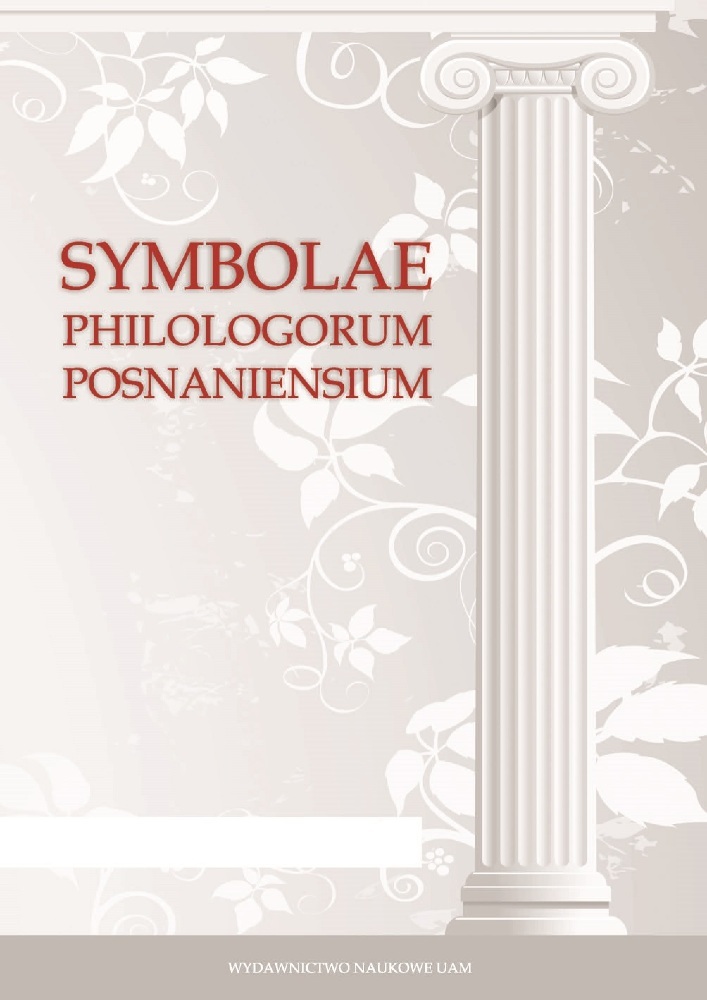Abstract
The article is an attempt at the psychoanalytic interpretation of the Euripidean Heracles. The theory used to explain psychological phenomena of the play is Melanie Klein’s concepts of the paranoid-schizoid and depressive position, as well as contributions to the understanding of psychotic thinking made by her followers: Hanna Segal, Wilfred Bion, Herbert Rosenfeld, and John Steiner. Characters in the play, in their speech and behaviour, as well as in the chorus’ songs, reveal a significant number of primitive psychological mechanisms, such as splitting, denial, idealisation and projective identification. The analysis of those mechanisms expressed in literary material allows to see the much argued continuity of Euripides’ extraordinary play.
References
Primary sources:
Eurypides, Hercules, ed. K.H. Lee, BSB B.G. Teubner Verlagsgesellschaft, Leipzig 1988.
Secondary sources:
Arrowsmith 1954: Arrowsmith, W. The Conversion of Heracles, Diss. Princeton, Princeton).
Barlow 1982: Barlow, S. A. 1982. “Structure and Dramatic Realism in Euripides’ Heracles.” Greece & Rome, 2nd series, 29, no. 2:115–125.
Bion 2010: Bion, W.R. 2010. Uwaga i interpretacja, translated by D. Golec, Warszawa.
Burnett 1971: Burnett, A.P. 1971 . “The Madness of Heracles”, in: Catastrophe Survived, 165. Oxford.
Chalk 1962: Chalk, H.H.O. 1962. “Ἀρετή and Βία in Euripides’ Herakles”, Journal of Hellenic Studies 82:7–18.
Conacher 1967: Conacher, D. J. 1967. Euripidean Drama, Toronto and London.
Czerwińska 2005: Czerwińska, J. 2005. “Eurypides i jego twórczość dramatyczna”, In: Literatura Grecji starożytnej, vol. I, H. Podbielski, I, H. 2005 (ed.). Lublin.
Dodds 2001: Dodds, E.R. 2002. Grecy i irracjonalność, translated by J. Partyka, Bydgoszcz.
Dybel 2009: Dybel, P. 2009. Okruchy psychoanalizy. Teoria Freuda między hermeneutyką i poststrukturalizmem, Kraków.
Easterling and Knox 1985: Easterling, E. and Knox, B.M.W. 1985. (ed.), The Cambridge History of Classical Literature, Cambridge.
Ferguson 1969: Ferguson, J. 1969. “Tetralogies, Divine Paternity, and the Plays of 414”, Transactions and Proceedings of the American Philological Association 100: 109–117.
Fitzgerald 1991: Fitzgerald, G. J. 1991. “The Euripidean Heracles: An Intellectual and a Coward?”, Mnemosyne 4th series 44: 85–95.
Galinsky 1972: Galinsky, G. K. 1972. The Herakles Theme, Oxford.
Hamilton 1985: Hamilton, R. 1985. “Slings and Arrows: The Debate with Lycus in the Heracles”, Transactions of the American Philological Association 115: 19–25.
Harsh 1948: Harsh, P.W. 1948. A Handbook of Classical Drama, Stanford.
Hartigan 1987: Hartigan, K. 1987. “Euripdean Madness: Heracles and Orestes”, Greece and Rome 34: 126–35.
Holland 1993: Holland, N.N. 1993. “Psychoanalysis and Literature – Past and Present”, Contemporary Psychoanalysis 29 (1): 5–21.
Holland 1998: Holland, N.N. 1998 “Reader-Response Criticism”, International Journal of Psychoanalysis 79: 1203–1211.
Kamerbeek 1966: Kamerbeek, J.C. 1966. “The Unity and Meaning of Eurypides’ Heracles, Mnemosyne 4th series, 19: 1–16; Kirk 1970: Kirk, G. S. 1970. Myth: Its Meanings and Functions in Ancient and Other Cultures, Cambridge.
Kitto 1997: Kitto, H.D.F. 1007. Tragedia grecka. Studium literackie, translated by J. Margański, Bydgoszcz.
Klein 2007a: Klein, M. 2007 Miłość, poczucie winy i reparacja. Pisma, vol. I, translated by A. Czownicka, H. Grzegołowska-Klarkowska, Gdańsk.
Klein 2007b: Klein, M. 2007. Zawiść i wdzięczność. Pisma, vol. III, translated by A. Czownicka, H. Grzegołowska-Klarkowska, Gdańsk.
Lesky 2006: Lesky, A. 2006. Tragedia grecka, transl. M.Weiner, Kraków.
Mikalson 1986: Mikalson, J. D. 1986. “Zeus the Father and Heracles the Son in Tragedy”, Transactions of the American Philological Association 116: 89–98.
Murray 1946: Murray, G. 1946. Heracles: Best of Men, [in:] Greek Studies, 112. Oxford.
Norwood, 1964: Norwood, G. 1964. Essays on Euripidean Drama, London–Toronto.
Ogden 1994: Ogden, T. 1994. “The Analytic Third: Working with Intersubjective Clinical Facts” International Journal of Psychoanalysis 75: 3–19.
Ogden 2010: Ogden, T. 2010. Ponowne odkrywanie psychoanalizy. Myślenie, śnienie, uczenie się i zapominanie, translated by L. Kalita, Warsaw.
Ogden 2011: Ogden, T. 2011. Sztuka psychoanalizy. Śnienie niewyśnionych snów i urwanych krzyków, translated by D. Golec and L. Kalita, Warsaw.
Padilla 1992: Padilla, M. 1992. “The Gorgonic Archer: Danger of Sight in Euripides’ Heracles”, Classical World 86: 1–12.
Parry 1965: Parry, H. 1965. “The Second Stasimon of Euripides’ Heracles (637–700)”, American Journal of Philology 86: 363–364.
de Romilly 1994: de Romilly, J. 1994. Tragedia grecka, translated by I. Sławińska, Warszawa.
Segal 2005: Segal, H. 2005 Wprowadzenie do teorii Melanie Klein, translated by Ł. Penderecki, Gdańsk.
Segal 2006 (1957): Segal, H. 2006. “Uwagi o tworzeniu symboli” (1957), in: Teoria Melanie Klein w praktyce klinicznej, translated by D. Golec, G. Rutkowska, A. Czownicka, Gdańsk.
Sheppard 1916: Sheppard, J. T. 1916. ‘The Formal Beauty of the “Hercules Furens”’, Classical Quarterly 10: 72–79.
Silk 1985: Silk, M. S. 1985. “Heracles and Greek Tragedy”, Greece & Rome, 2nd series, vol. 32, No. 1: 1–22.
Steiner 2010: Steiner, J. 2010. Psychiczny azyl. Patologiczna organizacja osobowości u pacjentów psychotycznych, nerwicowych i borderline, translated by M. Żylicz, L. Kalita, M. Lipińska, Gdańsk.
Stróżyński 2013: Stróżyński, M. 2013. ‘Love, Aggression, and Mourning in Euripides’ Heracles’, Eos 100: 223–250.
Verrall 1905: Verrall, A.W. Four plays of Eurypides, Cambridge 1905.
von Wilamowitz-Moellendorf 1895: von Wilamowitz-Moellendorf , U. 1895. Euripides’ Herakles, Berlin.
Willink 1988: Willink, C.W. 1988. “Sleep after Labour in Euripides’ Heracles”, Classical Quarterly 38: 86–97.
Winnington-Ingram 1960: Winnington-Ingram, R.P. 1960. “Hippolytus: a study in causation”, in: Euripide, Entretiens sur l’antiquité classique VI: 169–197.
Yoshitake 1994: Yoshitake, S. 1994. “Disgrace, Grief and Other Ills: Herakles’ Rejection of Suicide”, The Journal of Hellenic Studies 114: 135–153.
License
